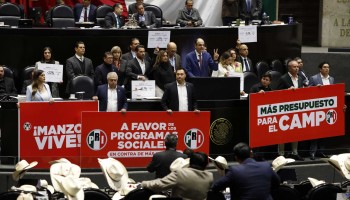Reported by
Mexican President Claudia Sheinbaum said Wednesday that the extradition of 26 suspected cartel members to the United States a day before was a “sovereign decision” made to protect Mexico’s security.
Her remarks came after her government placed the suspects — alleged members of the Jalisco New Generation Cartel (CJNG) and the Sinaloa Cartel — on a U.S.-bound plane. The men are wanted in the United States on drug trafficking and related charges. U.S. prosecutors assured Mexico that none would face the death penalty.
For some time, U.S. President Donald Trump has pressed Mexico to intensify its war against drug cartels, even considering sending soldiers into Mexican territory.
But Sheinbaum emphasized that the decision to send the 26 suspects to the United States on Tuesday was made solely by Mexican authorities.
“These are sovereign decisions made in Mexico for the security of our country, and they are made based on an analysis by the National Intelligence and Investigation System itself, the National Security Council,” she said.
The extradition marks the second such transfer of suspects since Sheinbaum took office in October.
U.S. officials hailed the move as a milestone in bilateral cooperation.
“This transfer is yet another example of what is possible when two governments unite against violence and impunity,” U.S. Ambassador to Mexico Ronald Johnson said. “These fugitives will now face justice in American courts, and the citizens of both our nations will be safer.”
Tuesday’s operation mirrored a February transfer of 29 alleged cartel leaders, which sparked debate in Mexico over whether the government acted on solid legal grounds or yielded to political pressure from Washington.
That pressure has grown in recent weeks. Trump has tied Mexico’s trade privileges to its efforts to curb fentanyl trafficking and last week ordered the Pentagon to prepare operations against Mexican drug groups, which his administration has labeled as global terrorist organizations.
Sheinbaum has rejected any possibility of U.S. military action on Mexican soil as “unacceptable” but said both governments are close to finalizing a new security agreement to expand intelligence sharing and joint enforcement operations.
The CJNG and Sinaloa Cartel remain locked in a violent struggle for control of drug routes, driving record homicide rates in Mexico and fueling the fentanyl crisis in the United States. The 26 suspects will face trial in U.S. courts, but their removal is likely to reverberate politically on both sides of the border.






